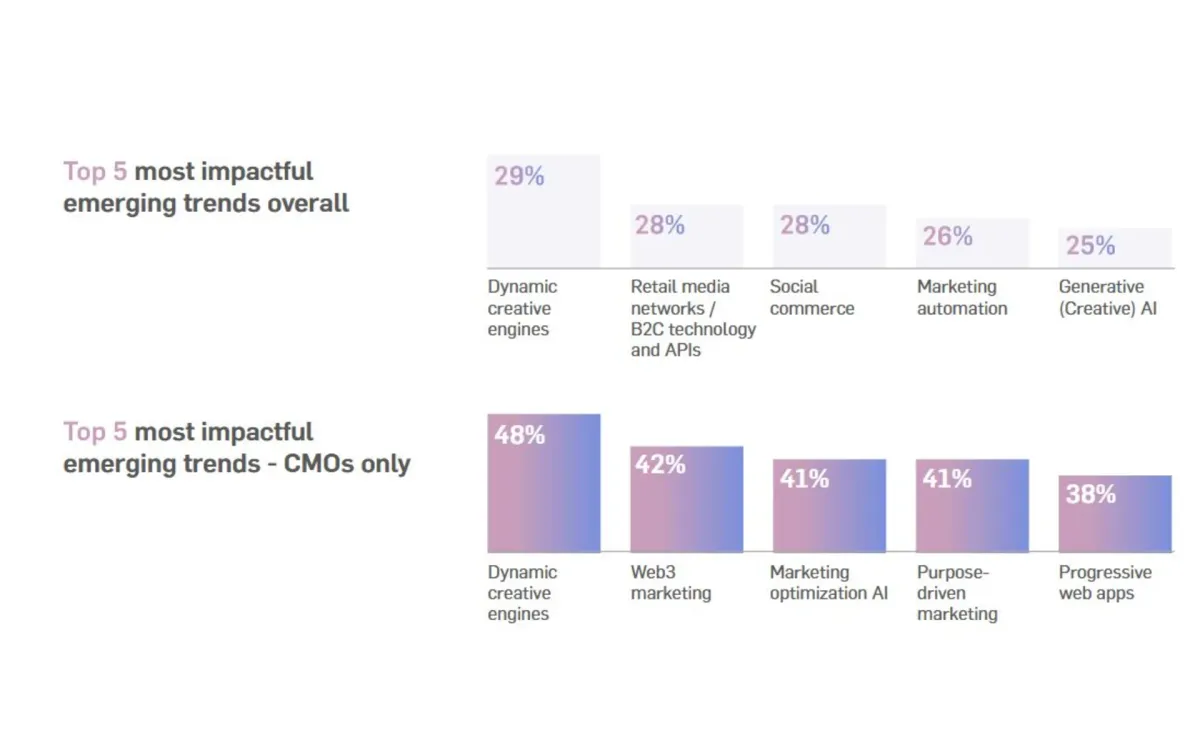
A comprehensive survey of over 700 senior marketing leaders conducted by Clear M&C Saatchi & Google between March and May 2024 reveals significant shifts in marketing technology adoption and strategic priorities. According to the research findings, marketing executives are moving beyond theoretical discussions of artificial intelligence to practical implementation.
The study, which spans 12 markets across EMEA, Americas, and APAC regions, highlights that 28% of marketing leaders identify implementing AI and machine learning technology as their top priority for driving impactful marketing outcomes. The research encompasses responses from organizations of varying sizes, with 28% representing brands generating over $1 billion in annual revenue.
Dynamic creative engines emerged as the most influential emerging trend, with 29% of respondents citing their significance. According to the survey data, these systems generate and optimize advertising creative in real-time based on user data and context, addressing two critical challenges: personalization at scale and efficient, data-driven creative processes.
The survey findings indicate that 71% of marketing leaders expect AI to reshape their hiring practices, focusing on recruiting professionals skilled in maximizing AI capabilities. This transformation extends beyond mere efficiency gains, as three-quarters of respondents plan to increase their technology and infrastructure investments to fully leverage AI's potential.
Privacy concerns rank as the second highest priority, with 23% of marketing leaders focusing on adapting to changing regulations and technology in user privacy. The research reveals that 53% of respondents claim familiarity with upcoming privacy changes and their potential business impact. Among those anticipating privacy-related changes, 61% are developing owned customer data and media channels to reduce dependence on third-party advertising.
The agency-client relationship continues to evolve, with 32% of marketing leaders planning to explore new agency capabilities in the coming year. This contrasts with 28% who intend to bring agency expertise in-house. The survey identifies ecommerce (74%), product marketing (72%), and marketing analytics (72%) as the top areas where marketing leaders expect to increase agency investment.
Diversity, equity, and inclusion remain crucial factors in agency selection, with 46% of marketing leaders expecting agencies to exceed their internal DEI commitments. This emphasis reflects a growing recognition that diverse teams are essential for creating effective AI-driven marketing solutions.
The research methodology encompassed responses from 757 global marketing leaders managing substantial budgets, with 41% overseeing annual marketing expenditures between $10 million and $50 million. Regional variations emerged in priorities, with Americas-based leaders emphasizing technological prowess and recognition, while EMEA and APAC leaders prioritize demonstrated business growth capabilities.
The survey indicates that marketing leaders seek partners who can demonstrate clear business impact, with track record of helping clients achieve business growth ranking as the primary criterion for agency selection. This is followed by demonstrated category experience and the use of proprietary data and technology.
Looking ahead, the research suggests continued acceleration in AI integration across marketing functions. Marketing leaders anticipate the emergence of AI-human hybrid teams driving unprecedented levels of efficiency and creativity, marking a significant shift from theoretical possibilities to practical implementation.
The findings establish 2024 as a pivotal year for marketing technology adoption, with leaders focused on harnessing change to drive innovation and growth rather than merely anticipating future developments. This transformation requires agencies to adapt their approaches and demonstrate measurable impact on business outcomes.

